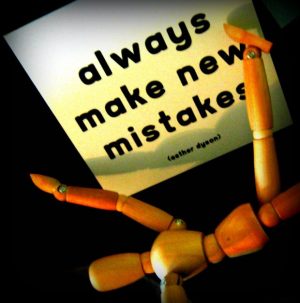Too many undergraduate students are afraid of making mistakes. It’s not surprising. They’ve spent years in a system where memorization and spitting out information was more important than learning and understanding: the high-stakes standardized testing environment. In that environment, students learn that the person who makes the fewest mistakes gets the best scores, the most attention, and the most approval, right?
Then they arrive in college. Suddenly, the focus shifts from getting the right answer towards analyzing it and debating whether it’s right or not, or what “right” means. They’re confused, they’re intimidated, and they freeze. I had one student come to my office and tell me that he couldn’t deal with my statement that the days of “one right answer” were over. Why? Because that’s the only way he knew how to succeed – knowing the one right answer.
This gets worse if their focus is still on grades, as it so often is. Instead of allowing students to focus on what they learned, the system requires them to bean-count – to focus entirely on the difference between an 89.5% and an 89.9% as if it’s even meaningful.
I’d like to suggest a different way to look at mistakes.
The process of learning is about:
- trying
- failing
- figuring out what went wrong
- doing it better next time
You are not exempt from this fundamental law – you are human.
Therefore, there is no shame in making a mistake, as long as you learn from it. If you made a mistake with a particular equation, the answer is to go and learn that equation until you know it backwards and forwards. If you made a mistake in writing, the answer is to learn how to recognize that mistake so that you can correct it in the future. If you made a mistake while you were out on the court or the field, the answer is to practice the right technique until you have it nailed down.
But you won’t know you need to work on it if you do not make the mistakes.
Ask yourself these questions at the end of each week, to get you started on making positive mistakes:
- What was the best mistake you made this week?
- What did you learn from it?
- How will you change your approach the next time you encounter a situation like this?
Use mistakes to your benefit. Learn from them. But don’t beat yourself up about making them, unless you fail to apply what you’ve learned and you keep making the same mistake.

